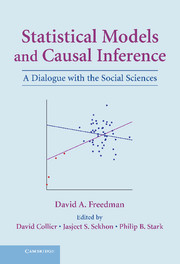Book contents
- Frontmatter
- Contents
- Preface
- Editors' Introduction: Inference and Shoe Leather
- Part I Statistical Modeling: Foundations and Limitations
- Part II Studies in Political Science, Public Policy, and Epidemiology
- 4 Methods for Census 2000 and Statistical Adjustments
- 5 On “Solutions” to the Ecological Inference Problem
- 6 Rejoinder to King
- 7 Black Ravens, White Shoes, and Case Selection: Inference with Categorical Variables
- 8 What is the Chance of an Earthquake?
- 9 Salt and Blood Pressure: Conventional Wisdom Reconsidered
- 10 The Swine Flu Vaccine and Guillain-Barré Syndrome: A Case Study in Relative Risk and Specific Causation
- 11 Survival Analysis: An Epidemiological Hazard?
- Part III New Developments: Progress or Regress?
- Part IV Shoe Leather Revisited
- References and Further Reading
- Index
6 - Rejoinder to King
Published online by Cambridge University Press: 05 June 2012
- Frontmatter
- Contents
- Preface
- Editors' Introduction: Inference and Shoe Leather
- Part I Statistical Modeling: Foundations and Limitations
- Part II Studies in Political Science, Public Policy, and Epidemiology
- 4 Methods for Census 2000 and Statistical Adjustments
- 5 On “Solutions” to the Ecological Inference Problem
- 6 Rejoinder to King
- 7 Black Ravens, White Shoes, and Case Selection: Inference with Categorical Variables
- 8 What is the Chance of an Earthquake?
- 9 Salt and Blood Pressure: Conventional Wisdom Reconsidered
- 10 The Swine Flu Vaccine and Guillain-Barré Syndrome: A Case Study in Relative Risk and Specific Causation
- 11 Survival Analysis: An Epidemiological Hazard?
- Part III New Developments: Progress or Regress?
- Part IV Shoe Leather Revisited
- References and Further Reading
- Index
Summary
Abstract. King's “solution” works with some data sets and fails with others. As a theoretical matter, inferring the behavior of subgroups from aggregate data is generally impossible: The relevant parameters are not identifiable. Unfortunately, King's diagnostics do not discriminate between probable successes and probable failures. Caution would seem to be in order.
Introduction
King (1997) proposed a method for ecological inference and made sweeping claims about its validity. According to King, his method provided realistic estimates of uncertainty, with diagnostics capable of detecting failures in assumptions. He also claimed that his method was robust, giving correct inferences even when the model is wrong.
Our review (Freedman, Klein, Ostland, and Roberts 1998 [Chapter 5]) showed that the claims were exaggerated. King's method works if its assumptions hold. If assumptions fail, estimates are unreliable: so are internally-generated estimates of uncertainty. His diagnostics do not distinguish between cases where his method works and where it fails. King (1999) raised various objections to our review. After summarizing the issues, we will respond to his main points and a few of the minor ones. The objections have little substance.
Model comparisons
Our review compared King's method to ecological regression and the neighborhood model. In our test data, the neighborhood model was the most accurate, while King's method was no better than ecological regression. To implement King's method, we used his software package EZIDOS, which we downloaded from his web site.
- Type
- Chapter
- Information
- Statistical Models and Causal InferenceA Dialogue with the Social Sciences, pp. 97 - 104Publisher: Cambridge University PressPrint publication year: 2009

